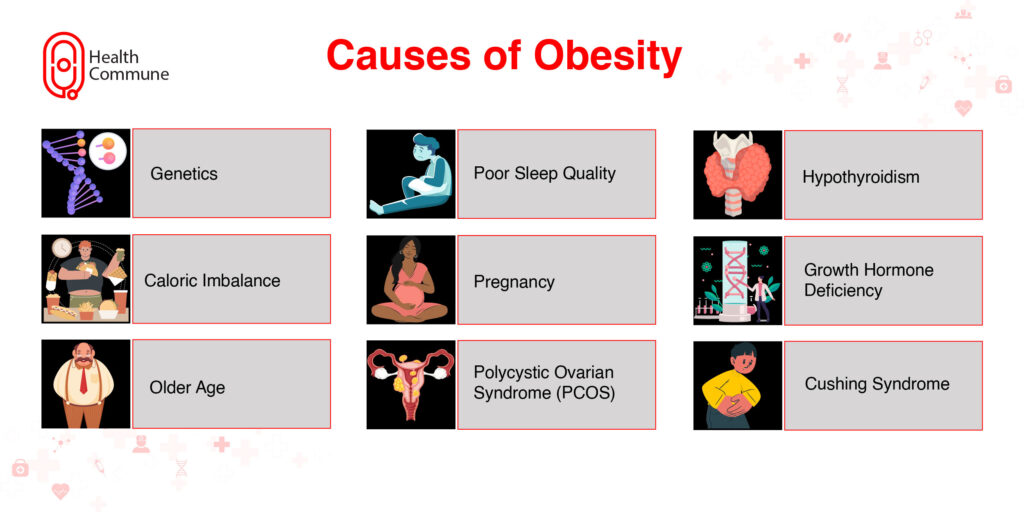Obesity can be defined as the excessive or abnormal accumulation of fat or adipose tissue that impairs the body. It is considered to be the second-most preventable cause of death after smoking. This article explains obesity, its causes, complications, and management.
What is obesity?
Obesity is a complex disease that involves the accumulation of excess body fat which has a negative impact on health. It increases the risk of diseases like diabetes, high blood pressure, and even cancer.
Healthcare providers mostly use body mass index (BMI) as a tool to screen for obesity, which is the measure of body fat based on height and weight. Therefore, obesity can also be referred to as a condition with a BMI of >30.
What are the types of obesity?
Obesity can be classified on the basis of body mass index (BMI). BMI can be calculated by a person’s weight in kg divided by the square of their height in metres (Kg/m2).
In this calculation, 18.5 and below are considered to be underweight, 18.5 to <25 as normal weight, and 25 to <30 as overweight. Obesity is of
- Class 1 obesity: BMI 30 to <35
- Class 2 obesity: BMI 35 to <40
- Class 3 obesity: BMI 40 or higher

What causes obesity?
The most common cause of obesity is the imbalance between the calories consumed and the calories expended. It occurs due to a high-calorie diet and a lack of physical exercise.
Common, specific causes include:
- Genetics affects how your body processes food into energy and how fat is stored in the body.
- Older age can lead to less muscle mass and a slower metabolic rate, making it easier to gain weight
- Lack of sleep or poor sleep quality leads to hormonal changes that increase cravings for high-calorie food
- Weight gained during pregnancy may eventually lead to obesity for some women
There are certain health conditions that can also cause weight gain, like
- Polycystic ovarian syndrome is caused by an imbalance of female reproductive hormones
- Cushing syndrome is caused by high levels of cortisol (a stress hormone) in your system
- Hypothyroidism is the lack of thyroid hormones produced by the thyroid gland
- Growth hormone deficiency is associated with increased fat deposition in the waist region and insulin resistance
What are the risk factors for obesity?
- Genetics: involvement of certain genes makes it difficult to lose weight.
- Composition of gut microbes
- Environmental factors that put you at risk include
- A lack of healthy food options
- Sedentary lifestyle
- Psychological and other factors include
- Depression and the use of certain antidepressant drugs
- Medications like steroids and birth control pills
What are the complications related to obesity?
The excessive accumulation of fat in the body puts excess strain on your bones and internal organs. They also cause inflammation in the body, which increases the risk of diseases like cancer. The other diseases related to obesity include
- Type 2 diabetes
- Heart disease
- High blood pressure
- Certain cancers (breast, colon, and endometrial)
- Stroke
- Gallbladder disease
- Fatty liver disease
- High cholesterol
- Sleep apnea
- Arthritis
- Infertility
How is obesity diagnosed?
Body mass index (BMI) is the first method used to diagnose obesity; other than that, the tests that measure body fat and body fat test distribution include:
- Skinfold thickness test
– Used to estimate the amount of fat present in the body
– A practitioner pinches the athlete’s skin with the thumb and forefinger, slightly drawing the skin away from the body, and measures the skinfold using a device called a calliper.
– The thickness of the subcutaneous fat tissue beneath the skin is estimated using this technique. - Waist-to-hip comparisons
– Determines how much fat is stored in your hips, waist and buttocks.
– According to WHO, the waist-hip ratio should be 0.9 or less in men and 0.85 or less in women - Screening tests like ultrasounds, CT scans and MRI scans
Healthcare professionals also recommend certain tests to find out the obesity risk-related diseases like
– Blood tests to examine cholesterol and glucose levels
– Liver function tests
– Thyroid tests
– Heart tests like electrocardiogram
Body mass index (BMI) is the first method used to diagnose obesity; other than that, the tests that measure body fat and body fat test distribution include:
- Skinfold thickness test
- Used to estimate the amount of fat present in the body
- A practitioner pinches the athlete's skin with the thumb and forefinger,
- slightly drawing the skin away from the body, and measures the skinfold
- using a device called a calliper.
- The thickness of the subcutaneous fat tissue beneath the skin is estimated using this technique
- Waist-to-hip comparisons
- Determines how much fat is stored in your hips, waist and buttocks.
- According to WHO, the waist-hip ratio should be 0.9 or less in men and 0.85 or less in women
- Screening tests like ultrasounds, CT scans and MRI scans
- Blood tests to examine cholesterol and glucose levels
- Liver function tests
- Thyroid tests
- Heart tests like an electrocardiogram
How is obesity managed?
The treatment plan includes
Dietary changes:
- Cutting down on portion sizes or snacks
- Following a low-calorie diet that is carbohydrate and fat restricted
- Including more fruits, vegetables, whole grains and legumes make you fuller and thus preventing heavy eating
- Following healthy eating habits
Increased activities
- Walking at a moderate pace, at least for 30 minutes a day, can help with weight loss
- Following a regular workout routine
Behavioural therapy
- Cognitive-behavioural therapy includes counselling and supportive therapy which helps manage all the mental stress and address mental and psychological factors.
Medication
A certain category of drugs, like appetite suppressant drugs, can intercept the pathways that play a role in your hunger. FDA-approved anti-obesity drugs include:
- Phentermine: decreases your appetite
- Orlistat: reduces the absorption of fat from the gut
- Liraglutide: reduces appetite and slows digestion
- Diethylpropion: reduces your appetite
- Phentermine-topiramate: reduces hunger
- Semaglutide: suppresses appetite.
- Cellulose and citric acid: give the feeling of fullness
Weight Loss surgery
Bariatric surgery (weight surgery)
- Bariatric surgery techniques modify your digestive tract.
- It works by limiting your calorie intake and absorption. Limit the amount of calories you can intake and absorb.
- They alter your metabolism and hunger by changing the hormonal factors in your digestive system.
The types of surgery include:
Gastric bypass surgery
A surgery in which a tiny pouch is created at the top of your stomach that will connect directly to your small intestine. Therefore food and liquids will flow via the pouch and reach the intestine, bypassing the stomach. It is also called Roux-en-Y gastric bypass surgery (RYGB).
Laparoscopic adjustable gastric banding (LAGB)
This surgery separates your stomach into two pouches using a band, which reduces the stomach’s capacity and slows down the passage of food into the stomach.
Gastric sleeve surgery
This procedure involves the surgical removal of a part of the stomach, leaving behind only a sleeve of the stomach. This restricts calorie intake and reduces hunger signals.
Biliopancreatic diversion with a duodenal switch
This is the most effective treatment and involves modification of both the stomach and small intestine. It combines gastrectomy (removal of part of the stomach) with an intestinal bypass, which shortens the path that food travels through the intestine.
How can obesity be prevented?
Obesity can be prevented by maintaining a healthier lifestyle, like:
- Doing moderate exercise like walking and swimming for at least 10 to 20 minutes a day.
- Including nutritious foods in your diet like fruits, vegetables, legumes, and lean meat
- Eat high-fat and high-calorie foods in moderate amounts





